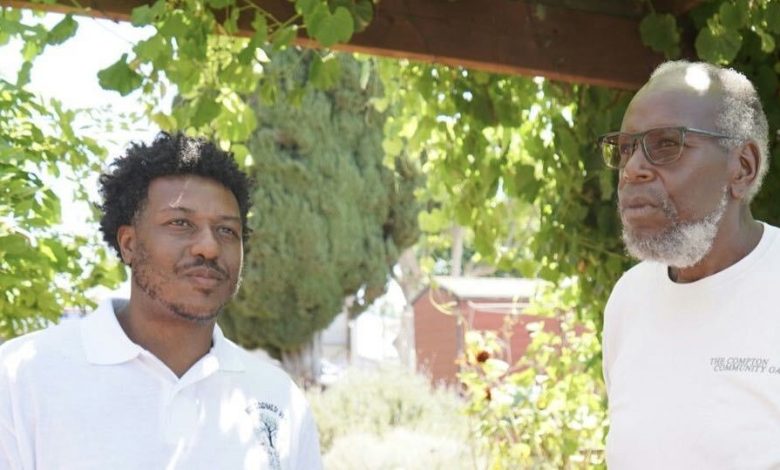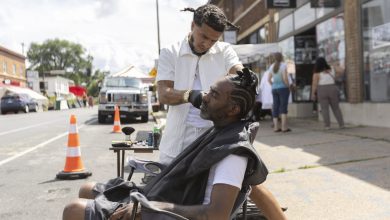USDA Cuts Food Business Centers Supporting Black Farmers

Over the past seven months, Kenneth Sparks lost at least five federal grants as a result of cancellations and funding freezes. The grants would have supported his four-year-old farm, where he grows vegetables, and sells seeds and eggs.
Now, the Southern California farmer is about to lose out again.
For the past two years, he gave free technical assistance, support, and education to Black farmers and producers in Los Angeles, Inland Empire, and San Diego. His work was funded through the Southwest Regional Food Business Center. The Southwest center — led by the University of California — covers Arizona, California, Nevada, Utah, and Tribal communities. It is one of 12 centers nationwide that was part of a $400 million program established under the Biden administration. It was designed as a pandemic-era, five-year initiative that would conclude in 2028.
Sparks was planning a gathering in California to help more farmers network and connect to resources. But that won’t happen now.
On July 15, the USDA announced the elimination of the Regional Food Business Centers program, which provided up to $10,000 in grant funding to small and midsized farms and food businesses across the country. The funds were used for staff support, business planning activities, software implementation, equipment for food safety, processing, or packaging.
Eight of the 12 centers nestled across the country will honor existing commitments until September. But the rest will be shut down effective immediately.
The Delta Regional Food Business Center includes Alabama, Arkansas, Texas, Louisiana, and Mississippi, and is one of four programs that is now closed. Nearly 30% of the nation’s Black-operated farmers are located in the region. If the program had continued for five years, the USDA estimated that producers and processors would have seen a $100 million annual increase in regional sales.
U.S. Rep. Bennie Thompson, who represents Mississippi’s second congressional district, wrote in a statement to Capital B that shutting down the Delta center is another blow to Black farmers and rural communities.
“This center wasn’t just a federal grant program; it was an opportunity for farmers in the Mississippi Delta and across the South to access the capital, markets, and support they had been denied for generations,” Thompson said. “Pulling the plug on it now is short-sighted and shameful.”
The USDA said the program should not have been “established in this manner in the first place.”
“The Biden Administration created multiple, massive programs without any long-term way to finance them,” Secretary of Agriculture Brooke Rollins said in a statement. “This is not sustainable for farmers who rely on these programs, and it flies in the face of Congressional intent.”
This move comes in the wake of several cuts to grants, financial assistance, and programs by President Donald Trump’s administration. The administration is “stripping away a lifeline” to agriculture communities as farmers struggle to make ends meet, said U.S. Rep. Alma Adams, who represents North Carolina, which was part of the Southeast Regional Food Business Center that was also cut.
“Our small, midsized, and family farms are the backbone of our economy, but this administration has chosen to abandon them by defunding the Regional Food Business Centers,” Adams wrote. “Investing in our rural communities is always the right thing to do, and I demand the USDA reinstate this program so we can offer our farmers and agriculture producers the support they deserve.”
‘Pulling the rug out from under people’

More than 300 new food businesses were created as a result of the Southwest center program, a USDA report said. (Aallyah Wright/Capital B)
When the Eaton fire in California destroyed Altadena, Sparks lost one of his major customer bases: the local farmers market. Thanks to donations, he said he’s still able to provide free produce through his business, The Farmer Ken, to residents who are impacted by the fires.
Sparks said it’s been tough to navigate his business through the uncertainty of this administration, as well as the extreme weather changes. Luckily, he said, he’s been able to secure contracts, speaking engagements, and other partnerships to keep him afloat. He continues to apply for grants, which many advocates say is difficult for farmers who don’t have the time or access.
Despite his connections, Sparks is still facing challenges. He is still unable to secure resources such as crop insurance from the USDA.
“This is a very serious problem,” Sparks told Capital B. “The only thing that helped me is that I have diversified income, but there’s a lot of farmers who don’t have diversified income, and they’re really in a pinch.”
Tracy Celio, program manager for the Southwest center, said this is one of the reasons why the business centers have been so critical — it served in direct response to the barriers farmers faced.
Despite its short run, the program had seen some success.
A USDA report from December 2024 found that the centers led to more than 7,800 people receiving technical assistance, forming 2,600 new partnerships, and distributed about $600,000. More than 300 new food businesses were created as a result of this program, the report said.
Farmers and food businesses reported an increased access to institutional customers, knowledge, revenue, distribution, and storage. According to the report, the centers created pilot food hubs, collaborated with food banks, and launched a food hub for those with limited access to transportation and food in more remote areas.
Read more: USDA Ends Key Support for Black Farmers Amid Trump Anti-DEI Orders
For the Southwest center, the support has helped farmers purchase cold storage for their vegetables, Celio said. She said the hub helped one producer lease a vehicle to take their produce to the market. Another purchased a grain mill and was able to deliver their product to a nearby school.
The center has also partnered with organizations such as Diaspora Groceries, a nonprofit organization that supports wellness and food justice in south Los Angeles. Through the collaboration, the center provided marketing support to a food entrepreneur who makes West African chili oils and seasoning. Advocates at the center also helped another entrepreneur secure a contract at Costco to sell vegan cookies and other baked goods. Celio said they also helped a small organic farm that grows strawberries establish a relationship with a local elementary school to sell the produce to the district.

The four centers that will be shut down immediately include Great Lakes Midwest, Southeast, Delta, and Islands and Remote Areas. (U.S. Department of Agriculture)
One of the partners with Southwest center is Teresa Gipson, stakeholder engagement coordinator in the department of agriculture and sciences technology at Fresno State. Gipson’s focus is the future of farming. They’ve brought two youth organizations together to experience a two-week workshop that examines agriculture.
“The students that are in these programs are predominantly from at-risk communities, and we’re targeting those communities because we want to get back to some of the roots of agriculture, — especially the African American community — that has been pretty much altered by how we were introduced into this country,” Gipson said. “We’re trying to change that narrative for our youth so that we can claim what I think is a better articulation of and representation of agriculture.”
Since 2023, the Southwest center has served 2,000 individuals and over 1,000 organizations and businesses. The center was awarded $35 million, with $4.2 million for direct grants to farms and food businesses, according to Celio. But the center was only able to award $1.6 million before the recent cuts.
Black farmers expressed “a sense of abandonment” by the Trump administration, and it’s causing more trust issues, Gipson said.
“They are the first scientists. They are the innovators, and they are our first responders,” Gipson said. “But I don’t think that we have built our systems towards being innovative in responding to them.”
“In these times where we actually have grants, they are just pulling the rug out from under people.”
Gipson added that there needs to be policies in place to protect farmers rather than working with “non-absolute” grants. Gipson and Celio are looking for donors to keep the centers open.
“Hopefully there could be actual support for farmers from policymakers,” Sparks said.
“We are American farmers,” he said. “As much as [the agency] say they want to support the small scale farmers, they’re cutting the programs off that impact small farmers.”
The post USDA Cuts Food Business Centers Supporting Black Farmers appeared first on Capital B News.




